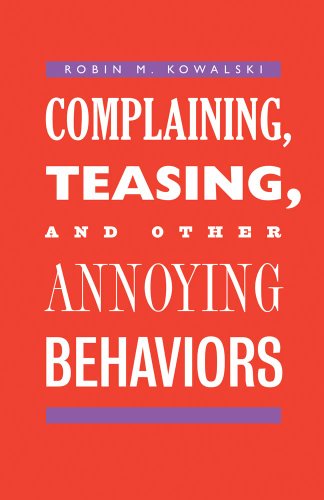complaining teasing annoying behaviors von kowalski robin (8 Ergebnisse)
Suchfilter
Produktart
- Alle Product Types
- Bücher (8)
- Magazine & Zeitschriften (Keine weiteren Ergebnisse entsprechen dieser Verfeinerung)
- Comics (Keine weiteren Ergebnisse entsprechen dieser Verfeinerung)
- Noten (Keine weiteren Ergebnisse entsprechen dieser Verfeinerung)
- Kunst, Grafik & Poster (Keine weiteren Ergebnisse entsprechen dieser Verfeinerung)
- Fotografien (Keine weiteren Ergebnisse entsprechen dieser Verfeinerung)
- Karten (Keine weiteren Ergebnisse entsprechen dieser Verfeinerung)
- Manuskripte & Papierantiquitäten (Keine weiteren Ergebnisse entsprechen dieser Verfeinerung)
Zustand Mehr dazu
- Neu (2)
- Wie Neu, Sehr Gut oder Gut Bis Sehr Gut (1)
- Gut oder Befriedigend (5)
- Ausreichend oder Schlecht (Keine weiteren Ergebnisse entsprechen dieser Verfeinerung)
- Wie beschrieben (Keine weiteren Ergebnisse entsprechen dieser Verfeinerung)
Einband
Weitere Eigenschaften
- Erstausgabe (1)
- Signiert (Keine weiteren Ergebnisse entsprechen dieser Verfeinerung)
- Schutzumschlag (2)
- Angebotsfoto (1)
Sprache (1)
Gratisversand
Land des Verkäufers
Verkäuferbewertung
-
EUR 5,74
Währung umrechnenKostenlos für den Versand innerhalb von/der USAAnzahl: 1 verfügbar
In den WarenkorbZustand: Very Good. 1 Edition. Used book that is in excellent condition. May show signs of wear or have minor defects.
-
Complaining, Teasing, and Other Annoying Behaviors
Anbieter: Better World Books: West, Reno, NV, USA
EUR 5,74
Währung umrechnenKostenlos für den Versand innerhalb von/der USAAnzahl: 1 verfügbar
In den WarenkorbZustand: Good. 1 Edition. Former library book; may include library markings. Used book that is in clean, average condition without any missing pages.
-
EUR 5,74
Währung umrechnenKostenlos für den Versand innerhalb von/der USAAnzahl: 1 verfügbar
In den WarenkorbZustand: Good. 1 Edition. Former library book; may include library markings. Used book that is in clean, average condition without any missing pages.
-
EUR 5,83
Währung umrechnenKostenlos für den Versand innerhalb von/der USAAnzahl: 1 verfügbar
In den WarenkorbHardcover. Zustand: As New. No Jacket. Pages are clean and are not marred by notes or folds of any kind. ~ ThriftBooks: Read More, Spend Less 0.8.
-
Complaining, Teasing, and Other Annoying Behaviors
Verlag: Cumberland, Rhode Island, U.S.A.: Yale Univ Pr, 2003, Cumberland, Rhode Island, U.S.A., 2003
ISBN 10: 0300099711 ISBN 13: 9780300099713
Sprache: Englisch
Anbieter: A Good Read, LLC, San Antonio, TX, USA
Erstausgabe
EUR 10,59
Währung umrechnenEUR 4,52 für den Versand innerhalb von/der USAAnzahl: 1 verfügbar
In den WarenkorbHardcover. Zustand: Very Good. Zustand des Schutzumschlags: Very Good. First Edition. Hard Cover. Very Good/Very Good. First Edition. 8vo - over 7¾" - 9¾" tall.
-
Complaining, Teasing, and Other Annoying Behaviors
Anbieter: Ria Christie Collections, Uxbridge, Vereinigtes Königreich
EUR 32,74
Währung umrechnenEUR 13,71 für den Versand von Vereinigtes Königreich nach USAAnzahl: Mehr als 20 verfügbar
In den WarenkorbZustand: New. In.
-
Complaining, Teasing, and Other Annoying Behaviors
Anbieter: Kloof Booksellers & Scientia Verlag, Amsterdam, Niederlande
EUR 15,95
Währung umrechnenEUR 30,00 für den Versand von Niederlande nach USAAnzahl: 1 verfügbar
In den WarenkorbZustand: very good. New Haven : Yale University Press, 2003. Hardcover. Dustjacket. 208pp. Condition : fine & unread. - Everyone has teased, nagged, betrayed, or lied to another person. Likewise, everyone has been the unfortunate object of such unpleasant behaviour. In this volume, social psychologist Robin Kowalski examines the intricacies of six annoying interpersonal types of behaviour: complaining, teasing, breaches of propriety, worry and reassurance-seeking, lying, and betrayal. She considers the functions of this behaviour, the types of people who are inclined to do them, the consequences for victims and perpetrators, and the ways in which such behaviour might be curtailed. "Complaining, Teasing, and Other Annoying Behaviors" provides a multifaceted picture of common annoying types of behaviour. The book answers these questions and many others: Why do people tease?; What are the consequences of annoying behavior for the people involved?; Is there a positive side to irritating behaviour?; Are people more likely to lie to those close to them or to strangers?; Do excuses and apologies diminish the hurtful effect of unpleasant behaviour?; and what is the relation of gender and culture to specific annoying acts Condition : very good copy. ISBN 9780300099713. Keywords : PSYCHOLOGY,
-
Complaining, Teasing, and Other Annoying Behaviors
Verlag: Yale University Press Jun 2014, 2014
ISBN 10: 0300209746 ISBN 13: 9780300209747
Sprache: Englisch
Anbieter: AHA-BUCH GmbH, Einbeck, Deutschland
EUR 48,29
Währung umrechnenEUR 61,45 für den Versand von Deutschland nach USAAnzahl: 1 verfügbar
In den WarenkorbTaschenbuch. Zustand: Neu. Neuware - Everyone has teased, nagged, betrayed, or lied to another person. Likewise, everyone has been the unfortunate object of such unpleasant behaviors. In this intriguing book, social psychologist Robin M. Kowalski examines the intricacies of six annoying interpersonal behaviors: complaining, teasing, breaches of propriety, worry and reassurance-seeking, lying, and betrayal. She considers the functions of these behaviors, the types of people who are inclined to do them, the consequences for victims and perpetrators, and the ways in which such behaviors might be curtailed. Complaining, Teasing, and Other Annoying Behaviors provides for the first time a multifaceted picture of common annoying behaviors. The book answers these questions and many others: \* Why do people tease \* What are the consequences of annoying behaviors for the people involved \* Is there a positive side to irritating behaviors \* Are people more likely to lie to those close to them or to strangers \* Do excuses and apologies diminish the hurtful effect of unpleasant behaviors \* What is the relation of gender and culture to specific annoying acts.




